#sharenting
Text
Being the child of an influencer, Vanessa tells me, was the equivalent of having a full-time job—and then some. She remembers late nights in which the family recorded and rerecorded videos until her mother considered them perfect and days when creating content for the blog stretched into her homeschooling time. If she expressed her unease, she was told the family needed her. “It was like after this next campaign, maybe we could have more time to relax. And then it would never happen,” she says. She was around 10 years old when she realized her life was different from that of other children. When she went to other kids’ houses, she was surprised by how they lived. “I felt strange that they didn’t have to work on social media or blog posts, or constantly pose for pictures or videos,” she says. “I realized they didn’t have to worry about their family's financial situation or contribute to it.”
Vanessa, who requested anonymity to speak freely about her family dynamics, says she helped create content for huge companies like Huggies and Hasbro when her mom landed endorsement deals. When she reached puberty and began menstruating, her mother had her do sponsored posts for sanitary pads. “It was so mortifying,” she says. “I just felt like I wanted to crawl into a hole and never come out.”
Being part of an influencer family changed everything about her life, Vanessa says. “Sometimes I didn’t know where the separation was between what was real and what was curated for social media.” And her mother’s online presence indelibly warped their relationship. “Being an influencer kid turned my relationship with my mom into more of an employer-employee relationship than a parent-child one,” she says. “Once you cross the line from being family to being coworkers, you can’t really go back.”
Vanessa will never get back the childhood that she gave up for the family business—not getting any of the money she helped earn is just another disappointment, even if it was entirely unsurprising. “My mom never led me to think there would be anything. She would continually remind me that the money she was getting from the blog or sponsorships was going toward us anyway through basic needs and that should be enough.”
330 notes
·
View notes
Text
The case against 'sharenting'
Yesterday, an Anon @bat-cat-reader got made me think. Long and hard, far and wide - research included.
Here is the Anon: https://www.tumblr.com/bat-cat-reader/750859423333908480/lo-bueno-de-estar-revisando-redes-constantemente?source=share . I wanted to piggyback first, then I realized the issue was way more important than the person in question. And decided to post everything separately.
Loved this very matter of fact, calm Anon and I totally agree with what was said about overexposing a child online.
This sudden surge of completely inappropriate information about that child raised an eyebrow, and then some more. It begs, as always when dealing with minors, the question of privacy, as opposed to using their image for what obviously is self-promotion. And more generally, what is called 'sharenting', a portmanteau combining 'sharing' (info) and 'parenting' that was quite recently invented by The Wall Street Journal to describe a more and more widespread phenomenon.
That some parents would just love to have and even share digital mementoes of their child(ren) is apparently ok. Others, however, choose to monetize their kids, turning them into a sales argument. I am still floored at such disingenuous choices, that might have serious consequences for their future. And I am not the only one, mind you: a 2018 report by England's Children Commissioner, the leading government official competent for protecting and promoting children's rights, found out that parental digital oversharing is a high risk behavior for the child.
Short term, as in identity theft ...


... to long term, as in lost academic or professional opportunities - the 2018 warning made only more compelling by the recent AI craze:
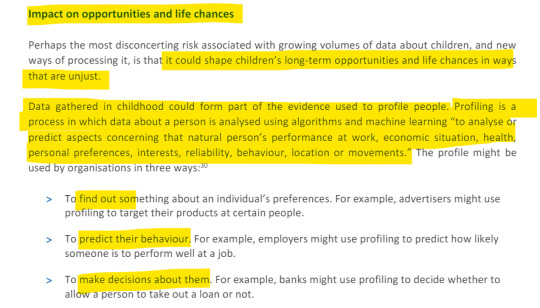
[Source: England's Children Commissioner Report 'Who Knows What About Me?', 2018 - online: https://assets.childrenscommissioner.gov.uk/wpuploads/2018/11/cco-who-knows-what-about-me.pdf]
You'll find this very recent article from The Guardian absolutely enlightening, too. I certainly did: https://www.theguardian.com/commentisfree/2024/feb/26/son-social-media-parents-children
Particularly this - I am not a mom, so Mordor bitches will certainly point this salient detail out, you see. But maybe this journalist mom's POV could give them (and maybe even other people) pause:
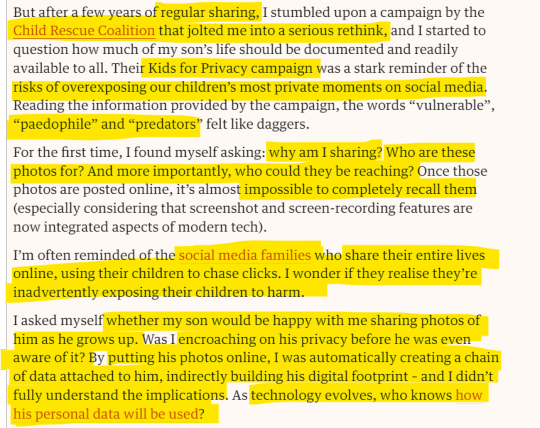
Pedophile. Quite chilling, right? Pedophile rings actively searching for children photos inadvertently being shared online, to feed sick obsessions worldwide (do not be parochial and think those pics must be of an ambiguous nature!). Instagram being currently in very hot water for its strange content promoting algorithm, allowing pedophiles to easily access children photos and personal data, based on exif. Digital kidnapping, as in criminals pretending to be the child's parents, for various financial or pathological reasons.
Think I am a stupid, stupid shipper with an agenda? Then so is the US House of Representatives Energy and Commerce Commission. Last year, a joint statement has been released by two if its members (and before Mordor starts screeching about 'the MAGA mommies obsession for pedophilia', let it be said it is a bipartisan, Democrat and Republican initiative), about the fact that 'Instagram hosts a vast network of pedophilic content and that its algorithms are actively driving users to this content':
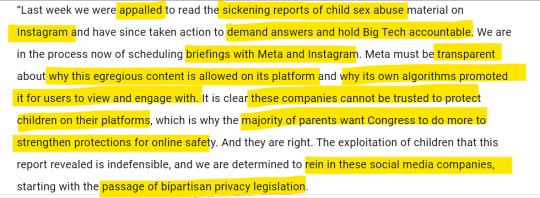
[Source: https://energycommerce.house.gov/posts/pallone-rodgers-demand-answers-from-instagram-after-reports-the-platform-is-driving-users-to-child-sex-abuse-material]
It followed a long report on Instagram's less than responsible practices in the matter, published by The Wall Street Journal, not your next door digital gossip rag (subscribers only, but you'll have an idea: https://www.wsj.com/articles/instagram-vast-pedophile-network-4ab7189?st=mbga8lpdddfm5dh&reflink=desktopwebshare_permalink)
Mark this statement: 'It is clear these companies cannot be trusted to protect children on their platforms'. I, not even a mom (but an aunt, a friend and a godmother, too), cannot even start to express my disgust at the hypocrisy of barely hiding children's faces on a certain blog, but at the same time allowing rabid speculation about a child's whereabouts, based on what is clearly a case of sharenting. All the mothers, grandmothers and aunts commenting under that post would have to take a long, hard look at themselves in a mirror. And also ask themselves why they allowed their personal fantasy to get an upper hand on common sense?
That is a terrible, terrible shame. And then people wonder why is C not sharing anything? Would you share your kid(s) to that mob? I wouldn't and it is my strong belief no mother in her right mind would.
Last but not least, reckless digital behavior comes with risks, costs and consequences. Including legal ones, taking into account what very probably is some loose, rather informal agreement of co-parenting (as opposed to a stricter, 50/50 shared custody system), as per Scottish family law. Something I shall briefly try to explain, for context purposes only:
Unlike many other legal systems in the world, the 1995 Scottish Children Act has a slightly different approach to custody (or what they call 'residence'), in which the child's best interest, as well as the parents' own agreement (called a Parenting Plan) are paramount. By the same token, it does not matter if the parents were married or just common law partners, for example. This allows for less cumbersome living and financial arrangements, provided the two parties agree, and also for quicker procedures, as the law does not encourage parents to go to Court, if an agreement has been reached ('no-order principle'). Mediation and legal assistance services are readily available to make every particular case fit in the local Parenting Plan framework. On the other hand, because in legal matters all things are (must be, really) symmetrical, it is relatively easy to have parental rights and responsibilities enforced (example: issue an order stipulating to cease and desist from posting on Instagram), or even removed, in Court. While removal is a bit of a hassle (supporting statements are required, either from an independent witness/not a relative or Social Welfare Services), the enforcement is way easier and just requires a basic contradictory procedure in Court.
For example, a child's proven overexposure on the Internet can very well be successfully contended in Court, if things go South. Especially in an emotionally loaded local context:
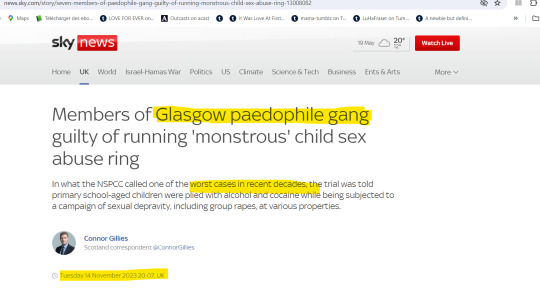
[Source: https://news.sky.com/story/seven-members-of-paedophile-gang-guilty-of-running-monstrous-child-sex-abuse-ring-13008082 - you read the article if you want, it's brutal]
I am not saying this will happen. What I am trying to say is simply that nobody (and I repeat: nobody) should play with fire, like this. Neither the parent, nor the public. This is a plea for decency across the dashboard I strongly felt I should make, if others won't.
No shitshow, no fantasy, no obsession should ever put a child's life at potential risk like that. You see, children are rarely asked if they would like to be shown off as circus monkeys.
89 notes
·
View notes
Text
You're not a 'family vlogger,' you're an abuser.
You're not an 'influencer', you're an exploitation artist.
You're not a 'snark youtuber protecting the rights of children'. you're a second-hand exploiter.
You're not a 'former child actor/influencer.' You're a survivor.
Thank you for coming to my Ted talk
7 notes
·
View notes
Text
Yeah. I'm done.
It's disappointing and a shame because I like her music, but more and more she just shows herself to be so morally repugnant
And I am calling it out because young girls need none of this bullshit shoved in their faces.
She has no integrity.
She is not educated
But she's also not intelligent.
Barely a high school diploma, and then straight into thr public eye in the music industry.
I pity children who are homeschooled, because it's usually by uneducated and undereducated parents.
She was so excited to take a picture with Taylor Swift at Jimmy Fallon late night and then a month or so later aligns herself with *that* family, making a video with that toxic kardashian woman -
Let's be clear , that whole family make money out of making people and young girls feel bad about themselves.
Toxic.
Horrific
Let's not amplify that platform
Nope. No thank you. Gross
We need to protect all our little sisters.
And its disappointing to me that that moment was using Taylor for her genuine hard earned global success and "fame". ( I know this would happen a lot but it's just disappointing when you're thinking someone couldn't go that far. I know Taylor has been targeted by some incredibly aggressive people for just being successful and someone that targeted her when she was 19 receiving an award to try and get fame for himself - that was so disgusting and incredibly horrific. Seriously, noone had heard of that idiot before that moment. It's so pathetic. And really morally repugnant and aggressive and horrifying and terrifying etc. Men who literally can't handle the fact that a young girl could be successful, whose image was very pg , and more successful than them .
If you think that misogyny doesn't exist think again, if someone can be that aggressive and destructive toward a 19 year old girl, who was already more famous than the interrupter , and I don't even think they banned him from the awards as punishment. And let me tell you, males resentful of a girl's, female's or woman at any age - 's success Are horrific, violent, aggressive - and everywhere. All a female or girl needs to do is to exist calmly near them, not even aware of them, and they want to about murder her for proving their egos wrong. Men, you need to work on your gender as a whole. It's horrific. And disgusting.
I digress only to make the point that any other female human being should just respect Taylor, for example, for having to go through all of that and be treated so badly, with no respect etc
Let alone another female in the industry.
But no. This one used her too.
Sigh.
I was already turning away extremely repulsed by the compleyely unethical, no brain idiocy of the way Meghan Trainor overexposes her child - and uses that as her brand- and then there was that - inside the womb photo- recently that noone asked for. Gross. I don't want to see that. Yuck. No.
Overexposure and overexploitation of her own children. What. No. Sharenting has gone too far. And with too public an audience.
That's their digital footprint. No nononononono.
She's a parent. And she's doing this to her own kids.
Gone are the days when nonone was really aware of the dangers of social media and sharing children's photos online. Or that conscious of it. Let alone on such an open, global scale.
We know now. We're well aware as a society.
I don't want to know what her child looks like.
I don't care what any celebrity's children look like, who they are etc. Their privacy needs to be respected, especially by their own parents.
They are real human beings. They're not toys.
She's not intelligent.
But she's also not kind.
She's selfish and using people- including her own child- for one of the worst attention seeking behaviour issues I've ever seen.
This 'girls got moxie' person whose video it is, in the video is lovely, and right.
Teaching is the worst job with the worst pay everywhere.
The psychological trauma alone.
Let alone the hours.
People don't get it because they don't see it. But they sure create it.
Respect your teachers.
And turn away from 'figures' in the current cultural zeitgeist who are so immoral and repugnant they will actively put a whole profession en masse in even more danger than they already are.
No. More.
Disappointing but true.
#People editing themselves out.
Protect your children ,and children you know, from people like this.
#Meghan Trainor#Teachers#Taylor Swift#Feminism#Respect#Equality#Misogyny#Kardashian#Disappointing#Sharenting#Children#Identity#Digital footprint#Ethics#Morality#Oversharing#Revolting#Morally repugnant#Schools#School safety
20 notes
·
View notes
Text
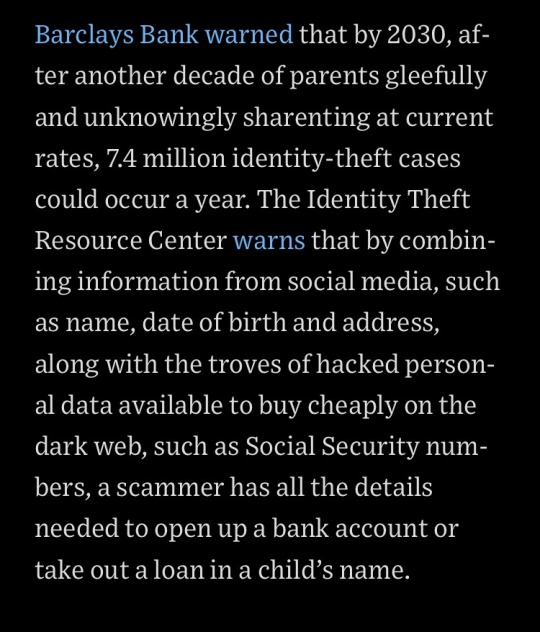
24 notes
·
View notes
Text
ATTENTION TUMBLR ⚠️ ⚠️ ⚠️
If you live in America, ESPECIALLY if you live in Washington state I am BEGGING YOU to show your support on THIS BILL
https://app.leg.wa.gov/billsummary?BillNumber=1627&Year=2023
House bill number 1627 will protect children being exploited on the internet and make it MANDATORY for their parents to put aside money for their children's future. In addition, it will also make it possible for these children to remove all content of them when they reach 18 years of age.
THIS BILL WILL CHANGE LIVES! POSSIBLY FOR MORE THAN WASHINGTON STATE RESIDENTS, BUT THE WHOLE COUNTRY!!!
I am begging you to take one moment out of your day to comment on this bill in support, or call DREW HANSENS office if you dont live in Washington to let the legislature know that WE WANT CHANGE!
I'm currently looking for bigger voices to get the word out about this amazing bill, so please tag anyone you can, especially people in Washington, and help me change the world, one post at a time.
#activism#attention#important#usa#washington state#legislature#proposed bill#kidfluencers#exploitation#child acting#child actor#protections for child actors#sharenting#share this
11 notes
·
View notes
Note
Different anon, but i feel the same way. Isn’t posting young kids’ full names and faces online still exploitative? Maybe they weren’t born with the sole intent of being money makers, but it’s still exposing young children to a massive audience when they’re too young to consent. I don’t think that sort of thing is suddenly free from harm just because there isn’t a stunt behind it. Parents oversharing their kids’ lives online without their consent, “sharenting” as it’s called, is quickly being recognized as a form of child abuse in a lot of the world. Even if we got everything else we wanted, coming out, babygate exposure, duet album or even 1D reunion, that kind of abuse is something i wouldn’t be able to stomach. And even if they don’t, i can so easily see certain larrie blogs argue that HL “owe” them “wholesome family content” after supporting them through over a decade of stunts, which i think would be the final nail in the coffin for me and this community. Real children’s well being is more important than larries getting “content.”
Hey, anon!
I don't think i'd go so far to equal 'sharenting' to abuse. It's controversial and can be exploitative (as you say). I think it depends on what gets shared and how. The parents often do it with good intentions and are possibly a bit naive to the potential consequeces. Some celebs want to show off their mini me's for narcissistic reasons though. It's overall morally gray.
I think it's a bit different when you are a celebrity. Exposing your child to the public as a celebrity may greatly benefit them. Nepotism is widespread in showbusiness and people knowing your face and your parents reputation gives you privilege, instant namerecognition and a head start in life. The kids can get brand deals, become influencers and carve out a career/secure an income source out of nothing. The kids are then set for life without an honest day of work. Just because of their name and parents. Think of Brooklyn Beckham (dude is famous, has never worked a day in his life), Lily Rose Depp and Blue Ivy Carter just to name a few. I don't think either of them blame their parents for exposing them to the public as children. They've greatly benefited of it.
Some celeb parents wants their kids to have a 'normal' life out of the spotlight and learn to do honest work, earn their own money and not live off of their parents. On the other hand some celebrity parents want their kids to catapult off their parents fame and money to become famous and rich themselves. Aka use their own privilege to get their kids the same privilege. Kids of celebs often grow up to want to be entertainers themselves. It's also not that hard to remove yourself from the spotlight when you're older if you so choose (see Aimee Osborne).
There is also massive media attention on celeb offsprings, so some may think 'Hey, they're going to be papped at some point anyways. Might as well sell the pics and story to People magazine and earn money off of it. It can go into their college fund'.
I'm not sure which route HL would take with their children. I think it would be hard to guard their privacy a 100 per cent. I agree the childrens well being is the most important thing. I just don't know if that means privacy out of the spotlight or ensuring them a life of opportunities just around the corner. Time will tell i guess.
3 notes
·
View notes
Text
Sharenting
21st century parenting is firmly grounded in technology. From iPads keeping kids entertained on flights, to apps that allow parents to track their children’s feeds, development, and more, technology has changed what it means to be a parent. But social media has added another dimension. The average child now has a digital footprint that often begins when their parents post an ultrasound photo, inviting friends and family to share in a joyous event through regular “sharenting.” However, some parents—especially those that adopted social media at an early age—have fallen into the trap of posting about their children a little too frequently, a condition called ‘oversharenting’. Like anything to do with social media, this comes with several risks. For this reason, it is important for parents to understand how to safely post about their kids.
What is sharenting?
Sharenting refers to the practice of parents sharing photos of their children online. Usually, images are shared on social media platforms like Instagram and Facebook, and capture quotidian moments in children’s lives, such as first steps, trips to the zoo, school performances, and holidays, for example. But as much as parents may want to share their children’s achievements and lives with friends and family, sharing photos online can be problematic.
There are, of course, some positives about sharenting. For example, parents often build communities online through social media platforms. This can be a great resource for parenting and gives first-time parents a sense of camaraderie during a time when they may feel like they have no idea what they are doing. Similarly, for parents who live far away from other family members and friends, sharing photos of their kids online offers a way to involve these important people in their children’s lives. However, when parents share images that contain personal details about the child, or details that could be embarrassing for the children as they become older, ‘oversharenting’ can become a problem.
As social media platforms like Facebook and Instagram have become more pervasive in society, sharenting has become very normalized. In fact, statistics show that parents are more than willing to share images and videos of their children online. As such, more than 75% of parents have shared their children’s images on social media, and 33% have never asked their children for permission before sharing photos online.
What are the dangers of sharenting?
While posting images of kids may seem innocuous, parents should be aware that sharing photos online—with family, friends, acquaintances, or the public—can be problematic. As such, there are several factors parents need to consider before posting pictures of their children on social media. These are especially pertinent because some of these considerations can present sharenting dangers, including:
The pervasiveness of social media.
The permanence of digital content and the internet.
Potential embarrassment as the child grows.
Identity theft from information in the shared information.
The problem is that once images are online, parents have no way of knowing how far they go and how other people might be able to use them. There is the added complication that whatever is posted online remains there forever, even if the original poster deletes it. ‘Oversharenting’ creates a digital footprint for the child whose picture is involved in the online photo sharing, which presents numerous potential complications, such as loss of privacy and financial or identity fraud, for example. Below are some of the sharenting dangers parents should be aware of.
Risk of identity theft
Many parents do not realize that their sharenting habits expose incredible amounts of personal information about their children. A survey conducted by Security ORG found that approximately 75% of parents shared a picture, story or video of their child online, and more than 80% of parents use their kids’ real names on social media posts. Cybercriminals can parse shared photos—and the accompanying captions—to figure out a child’s name, birthday, and location. By combining this with other information, perhaps gained through phishing or on the Dark Web through data breaches, these malicious actors can steal the child’s identity for nefarious means.
Permanence of digital content
Although many of the platforms parents use for sharing photos online with family and friends offer the ability to delete posts, this may not be enough to protect a child. Everything that is shared on the internet could leave a permanent trail, even if the original poster removes their post. As such, it is often better to not post an image in the first place, rather than risk ‘oversharenting’ with a photo that contains sensitive details that could put the child at risk.
Losing control of images
Another danger of online photo sharing is that posters have no control over what happens to their images once they are on the internet. Even though some parents may use privacy settings on their social media profiles, once they share images of their children, they have little ability to manage what people do with the photo. For example, people can save the images and share them with other people. The images could even be altered and misused by malicious actors. Another sharenting danger to consider is that most social media sites own any content posted to their platforms. This clause is usually hidden in the terms and conditions that most users scroll through without reading. As such, when a parent posts a photo of their child online, the platform on which it is shared has ownership of the image.
Sharenting dangers of child predators
Another potential consequence of parents sharing photos of their kids online is unwitting exposure to child predators. In the same survey by SecurityORG it found that nearly 80% of parents say they have social media connections whom they have never met in real life. The images parents share can contain information that allows predators to track children. For example, images might show the child’s school or uniform, or the street name of the family home, while geotags can allow people with nefarious intent to track the child’s real-time location. In addition, because parents cannot control how far these photos spread, it is impossible to know where they end up, even with privacy controls in place. As such, it is important for parents not to engage in ‘oversharenting’ images of their child and minimize the ability of potential predators to find and abduct the child.
Privacy and legal issues of oversharenting
One of the biggest problems with sharenting is the question of privacy. Young children are too young to consent to their parents sharing photos online with family and other people, and even older minors may not entirely grasp the full implications of posting online. In fact, a recent study found that 29% of parents share content about their child without getting the child’s consent; only 24% say they ask their child for permission to post each time. Furthermore, the study found that 32% of children say that their parent has shared a story, image, or video of them on social media even after they explicitly asked them to refrain. All of this suggests that online photo sharing has inherent privacy issues between children and parents.
Babies, by virtue of their limited communication skills, are incapable of giving informed consent to online photo sharing. But it is especially important for parents to consider the ramifications of sharenting, especially as their children grow. In certain countries, such as France and Germany, the legal system gives children the right to their own images. While the issue is more complex in the US, there are still privacy and legal issues to consider. The ”DaddyoFive” YouTube channel demonstrates why these issues are so complex. The channel was used as evidence of abusive behavior by the parents—the lawyers also argued that the way in which the videos were shared was a form of abuse— and resulted in two of the children concerned being taken into emergency custody.
Once children are old enough to understand social media and the ramifications of posting on these platforms, it is important for parents to begin asking for consent for online photo sharing. This not only demonstrates that the parents respect the children’s privacy, but also helps eliminate privacy issues between children and their parents. In addition, involving children in the process of deciding which photos can be shared online introduces them to the concept of responsible online etiquette before they begin using social media themselves.
Another privacy concern of sharenting is posting images of other people’s children, whether this is intentional or not. For example, parents often take photos of their children’s sporting events or performances in which other children appear. In these instances, it is crucial that parents ask the other children’s parents for consent to share these photos online.
10 tips for safely sharing photos online with family and friends
In light of the sharenting dangers outlined here, parents may well be wondering whether any online photo sharing of their children is safe. Of course, this is a very personal choice. Some parents choose not to post any images of their children at all. But for those who wish to continue sharing photos online with family, there are numerous ways to improve the security of these photos and minimize the risks of ‘oversharenting’. Here are some things to remember:
Check privacy settings: Ensure that all posts can only be seen by family and close friends and remove resharing permissions. Allowing strangers and acquaintances to see children’s photos can be a sharenting danger.
Have discussions about privacy with friends and family: Be vocal about protecting children’s privacy and set boundaries about how they can engage with posts.
Turn off metadata and geotagging: Not using these functions can minimize other people’s ability to track children through online photo sharing.
Do not include identifiable information: Whether it is in the photo itself or in the captions, be sure not to share details that would allow others to find and track children. This can include things like names, birthdates, schools, places they regularly go to, or even family homes.
Avoid using real names: Avoid giving people online access to children’s full names. Instead, use nicknames or descriptive phrases for kids.
Do not post potentially embarrassing images: Whether they are photos of the children in the bath or dressed in funny outfits, these images may cause problems for the child as they grow up.
Use secure platforms: Instead of sharing photos online, use more secure platforms to show pictures of children to friends and family. For example, WhatsApp protects photos with end-to-end encryption and gives users the option to send photos that can only be opened once.
Avoid showing the child’s face: To avoid ‘oversharenting’, some parents cover their children’s faces before posting their photos to social media. This can be done by using the “stickers” built into apps, like Instagram, to cover their faces or using editing tools to blur or block out their features.
Questions to consider when sharing photos online
Before sharing posts about their children on social media, parents should ask themselves several questions. These can help assess the potential implications of the posts and help parents decide if they are acceptable or would be considered ‘oversharenting’. Answer these questions sharing posting photos online:
Why is the post being shared? Perhaps it is to keep your friends and family updated about your child’s development, or it is simply because it is an adorable moment. Either way, it is important to understand the intention behind the post.
Would it be acceptable to allow someone else to share a similar post? While everyone approaches social media differently, it is important to consider whether the post would be okay if the roles were reversed. If the child in question is old enough to understand and give consent, ask them directly.
Is there anything potentially embarrassing about the post? Since things posted online can leave a permanent footprint, consider whether the post could cause the child embarrassment later in life.
Does the post contain anything that could be potentially compromising? As above, consider whether the post could cause difficulties for the child later in life. Perhaps there are religious or political sentiments that might bar the child from being employed at a certain company as an adult.
Would the child be happy to see the post as part of their digital footprint? Think about what the post says about the child, and how they might want to be perceived as an adult. Would the post be a nice memory or perhaps paint them in a negative light?
Think twice before sharenting
Sharenting is the natural result of a world where social media is used spontaneously to capture moments of life and share them with others. While the practice does have some advantages, parents should spare a little more thought when sharing photos of their children online. This is because sharenting can pose many dangers, including identity theft and exposure to potential predators. In addition, sharenting can result in negative repercussions for the child when they are older. For example, it could impact their job prospects. Since sharenting essentially creates their children’s digital footprints before they are old enough to consent to it, the practice can also create privacy issues between children and parents that can erode trust in that relationship. For all these reasons, it is important for parents to think twice before posting about their kids.
Source: Sharenting: What parents should consider before posting their children’s photos online
#Sharenting#Social Media#Parenting#Online Safety#Identity Theft#Child Privacy#Digital Footprint#Trust#Parental Responsibility#Job Prospects#Privacy Concerns#Child Development#Internet Safety#Online Behavior#Parental Consent#Education#Evansville#Indiana
0 notes
Text
Online beelden kinderen extra risicovol door AI
Het plaatsen van beeldmateriaal van je kinderen op sociale media is met de opkomst van kunstmatige intelligentie nóg gevaarlijker geworden, schrijft De Limburger. Dewi en Dylan die elkaar een onschuldig kusje geven? Het filmpje staat op TikTok, instagram, facebook of waar dan ook, voor je tot tien kan tellen. Over privacy hebben we dan vaak niet. Deutsche Telekom lanceerde eind 2023 een campagne…
View On WordPress
1 note
·
View note
Text
youtube
This video from The New York Times features minors confronting their parents about posting photos and other information about them online without their consent. It pertains to the topic of social media privacy and data ownership, as it divulges the risks of not having agency over your online privacy and highlights the blurry lines around who owns their social media content.
1 note
·
View note
Text
#Sharenting - Los riesgos de publicar fotos y videos de los más chicos en redes sociales.
Movistar presentó una campaña de concientización para sensibilizar a padres y madres sobre el Sharenting, nombre que recibe la práctica de compartir contenidos de niños y niñas en redes sociales de forma excesiva (Fuente Movistar Argentina).
Robo de identidad, grooming y ciberbullying son algunos de los riesgos asociados a internet que más escuchamos. Desde Movistar entendieron que es necesario…
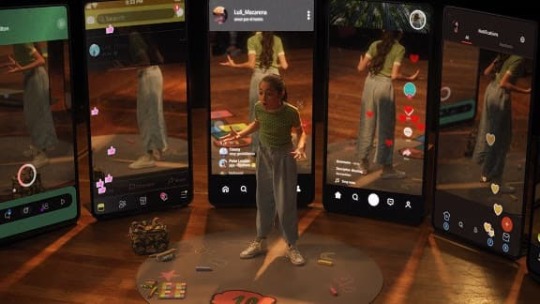
View On WordPress
0 notes
Text
Tragic: Abusive Owner Only Feeds Cat One Dinner Each Night

#(That's not my cat. Just a picture I found online.)#(No sharenting on my blog.)#Cat#Cats#Humor#Pets#23300th post
2 notes
·
View notes
Text
Why are crime accounts on tiktok so easily blocked by the app 🪦🪦 it's unfair
#meanwhile minors are sexualizing themselves#and there's A LOT of actual harming content#and let's remember the sharenting issue#but it seems the app can't take simple crime facts or interviews or merely informative shit?#god#what's wrong with y'all#@meyers
2 notes
·
View notes
Text
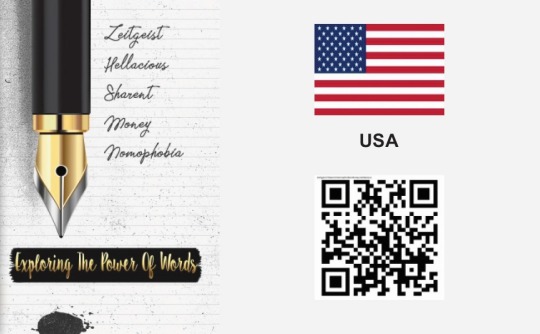
Countries Connected
through our title
Zeitgeist Nomophobia Hellacious Sharent Money
#countriesconnected #zeitgeist #nomophobia
#hellacious #sharent #money #freespirit #cuttingborders
0 notes
Photo

#Sharent #AtlanticOcean #NewYorkCity #Brooklyn #BrightonBeach #Beach #Sand #Surf #BriceDailyPhoto https://www.instagram.com/p/ChyBF_wrSEl/?igshid=NGJjMDIxMWI=
0 notes
Text
After Illinois passed the country’s first law protecting child influencers last week, a feeling of optimism swept over Sarah Adams.
For years, she and other advocates against child exploitation have warned about the dangers of sharing children’s lives on social media for profit. The law would ensure financial compensation for minors, defined as children under 16 years old, who are featured in vlogs, or video blogs.
While Adams is not based in the U.S., she and other activists who spoke with NBC News said they are excited by the news. They believe the legislation marks a precedent that could encourage similar action in states across the country.
“There is a lot of excitement that these conversations are not only being had, but that legislation is being enacted to protect the income that these kids are generating,” said Adams, a 38-year-old mother of two from Vancouver who calls out child exploitation online with her platform of more than 270,000 TikTok followers. “Because we need to be realistic: It’s the children that are generating the income for these families.”
Ethical concerns around “sharenting” have come under increasing scrutiny in recent years as family vloggers and parenting influencers continue to build massive followings online. Advocates have called out the harms of invading children's privacy and compromising their digital safety for clout or monetary gain, especially without informed consent.
[Read the rest]
#news#us news#usa news#illinois#illinois news#influencers#child influencers#social media#content creators#child labor#child labor laws#children's rights
167 notes
·
View notes